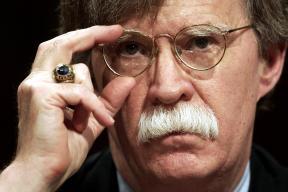 The Washington Post published what appears to be a USA-Today sized glossy summary from Rumsfeld's press office, through the defense secretary's apparent WP conduit, Josh White. Editorial comments are in parentheses, bold and italic print.
The Washington Post published what appears to be a USA-Today sized glossy summary from Rumsfeld's press office, through the defense secretary's apparent WP conduit, Josh White. Editorial comments are in parentheses, bold and italic print.Rumsfeld: U.S.
(Corporations) Won't Lose in Iraq
By Josh White
Washington Post Staff Writer
Tuesday, August 30, 2005; Page A03
FORT IRWIN, Calif., Aug. 29 -- Defense Secretary Donald H. Rumsfeld offered a passionate defense of the war in Iraq while speaking to a group of hundreds of soldiers at the Army's National Training Center on Monday afternoon, urging them not to give up on the war
(formerly) against
(weapons of mass destruction, then Al Quaeda terrorists, and now against US created) extremism
(in opposition to US-style free-take economics and indiscriminate murder of innocent civilians) as they prepare to re-enter the fight in coming months.
While Rumsfeld has consistently emphasized the need for the ongoing wars in Iraq and Afghanistan, his speech was particularly emphatic and included criticism of those in Congress and the media who have questioned the rate of
(outlandish spending on political supporters, and war industry corporations) progress, specifically in Iraq.
He said some people are emphasizing the negative aspects of the war -- such as the deaths of U.S. soldiers and Iraqi civilians at the hands of insurgents -- while failing to give appropriate attention to the "historic"
(puppet) democratic efforts there.
"We have no choice but to take the offensive," Rumsfeld told a packed auditorium of soldiers and families of those already deployed, arguing that a hasty withdrawal from Iraq is not a viable option. "People who want to toss in the towel were wrong yesterday, they're wrong today, and they'll be wrong tomorrow."
Facing mounting domestic pressure over the war as public support has waned in recent months, Rumsfeld directly addressed what he calls a misperception on the part of the American people. When one
(planted) soldier asked Rumsfeld at the town-hall-style meeting why troops in Iraq feel the war is going better than people at home do, the defense secretary replied that he believes good news and progress simply cannot compete with the war's bloody images.
Rumsfeld reiterated that
(a corporate controlled) democracy takes time and that it is not easy, adding that the problems the Iraqis are having in developing a constitution mirror the difficulties the United States had more than 200 years ago.
"The United States is not losing the global war against terrorism, nor are we losing the war in Afghanistan or Iraq," he said. Railing against violent extremists, he added, "They are what's wrong with the world."
Rumsfeld spoke with soldiers who are training in advance of new tours in Iraq, including a brigade of the 4th Infantry Division, which was part of the first deployment into the war. Pentagon officials said Monday that approximately 55 percent to 60 percent of soldiers with the 4th Infantry preparing to go to Iraq have been there previously, but they return to face insurgents who have grown more lethal and whose level of attacks in some areas of the country have remained consistent, even more than two years later.
After a speech about environmental conservation at a conference in St. Louis on Monday, Rumsfeld told reporters aboard his airplane that the troops about to go to Iraq in December -- about the time elections are scheduled there -- are going to face a very different situation than they did during their last rotation in 2003. Then, the focus was on ousting a dictator's government and freeing the
(natural resources of the) people of Iraq; now, it's about supporting
(puppet) Iraqi troops and handing the country over to the
(pro free-take) Iraqi people.
"The real battle we're fighting is the test of wills," Rumsfeld said en route to the Mojave desert.
At Fort Irwin, where temperatures were near 100 degrees, Rumsfeld echoed those comments to a boisterous and supportive crowd: "The U.S. military is not going to lose a battle or a war over there."
(Just tens of thousands of lives of soldiers and hundreds of thousands of lives of innocent civilians)
Still, he reiterated the need to wage war on
(petroleum rich) stages like Iraq, saying that such wars are the only means to secure America's
(green zone's) freedom and peace, the only way to
(create and) stave off the reach of Islamic extremism. He reminded listeners of the deaths on Sept. 11, 2001.
(which had nothing to do with Iraq)
"Your mission is to go on offense,
(like our foreign policy,) to go on the attack," Rumsfeld told the troops, praising those who are currently fighting. "They are engaging the terrorists where they live, so we don't have to engage them where Americans live
(in the green zone, Israel and its occupied territories, and at middle eastern petroleum installations)."The trip, during which Rumsfeld plans to attend President Bush's speech commemorating V-J Day on Tuesday, comes as Pentagon officials
(threaten, and therefore) expect violence in Iraq to get worse leading up to a scheduled constitutional referendum by Oct. 15 and then an election on Dec. 15. The next rotation of troops will allow for a temporary boost in U.S. force levels to roughly 160,000.
(to prevent the Sunnis from overwhelmingly turning out to vote the US drafted constitution down.)
After the Fort Irwin stop, Rumsfeld headed to San Diego. He plans to meet with Navy SEALs at the Naval Amphibious Base at Coronado on Tuesday. Rumsfeld visited the troops in California to wish them well and to let them know how much he appreciates what they are doing for the
(companies, uh I mean) country.
He took eight
(planted) questions, which dealt with a variety of issues, from Rumsfeld's involvement in wrestling in his youth to the Army recruitment shortfall to how to respond to people who suggest the United States should pull out of Iraq. Rumsfeld encouraged the soldiers to be proud and to stand strong.
"Everyone would like it to be perfect, and life isn't perfect," Rumsfeld said.
(nor fair for the hundreds of thousands of murdered and/or tortured innocent civilians and the thousands of dead soldiers and their families)







